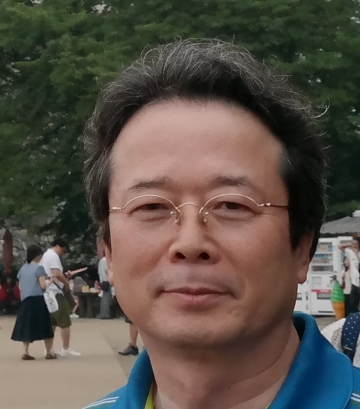교수
성노현 Seong, Rho Hyun
연구분야
면역학
분자생물학
1. T-cell Differentiation in the thymus
● Genetic and epigenetic control of T cell differentiation
● Control of thymocyte selection by transcription factors and chromatin remodeling complex
2. Differentiation of regulatory T-cells and Th17 cells in the periphery
● Control of regulatory T-cell development by transcription factors and chromatin remodeling complex
● Signaling factors regulating the differentiation and function of colonic Treg and Th17 cells
3. Regulation of early hematopoietic cell differentiation in the bone marrow
● Control of early B cell differentiation by chromatin remodeling complex and hematopoietic stromal cell factors
● Control of peripheral B cell differentiation by signaling factors
4. Genetic and epigenetic analysis of disease development
● Intestinal Bowel Diseases, Liver diseases using liver organoid culture
● Genetic and epigenetic control of T cell differentiation
● Control of thymocyte selection by transcription factors and chromatin remodeling complex
2. Differentiation of regulatory T-cells and Th17 cells in the periphery
● Control of regulatory T-cell development by transcription factors and chromatin remodeling complex
● Signaling factors regulating the differentiation and function of colonic Treg and Th17 cells
3. Regulation of early hematopoietic cell differentiation in the bone marrow
● Control of early B cell differentiation by chromatin remodeling complex and hematopoietic stromal cell factors
● Control of peripheral B cell differentiation by signaling factors
4. Genetic and epigenetic analysis of disease development
● Intestinal Bowel Diseases, Liver diseases using liver organoid culture
학력/경력
학력
- - 2003.4-2024.2 정교수
- - 1997.2-2003.3 부교수
- - 1993.3-1997.2 조교수
- - 1983.10-1990.1 박사 : 스탠포드대학교
- - 1981.3-1983.2 석사: 서울대학교 대학원 동물학과
- - 1977.3-1981.2 학사: 서울대학교 동물학과
경력
- - 1994.12-1996.11 학술간사, 한국동물학회
- - 1995.12-현재 이사, 대한면역학회
- - 1996.12-현재 이사, 한국동물학회
- - 1996.12-2000.11 편집간사, 한국생물과학협회지
- - 1997.4-2003.5 위원, 서울대학교 국제백신연구소 설립추진기획단
- - 1999.1-2003.1 장장, 서울대학교 실험동물사육장
- - 2001.1-2002.12 편집간사, Molecules and Cells ( 한국분자세포생물학회지)
- - 2002.5-2007.3 국제연구자문위원, 국제백신연구소
- - 2003.3-2006.2 설립추진위원/기획운영부장, 서울대학교 생명공학공동연구원
- - 2004.1-현재 이사/상임이사/감사, 국제백신연구소 한국후원회
- - 2005.6-2014.2 소장, 세포기능제어연구센터(SRC)
- - 2005.1-2005.12 총무운영위원, 한국분자세포생물학회
- - 2007.1-2008.12 사무총장, 제9회 세계세포생물학회 조직위원회
- - 2010.1-2010.12 학술위원장, 한국분자세포생물학회
- - 2011.3-2012.2 회장, 교육과학기술부 지원 우수연구센터(S/ERC) 소장 협의회
- - 2012.2-2012.7 학부장, 서울대학교 생명과학부
- - 2012.7-2014.7 처장/산학협력단장, 서울대학교 연구처
- - 2013-2016 국제연구자문위원, 국제백신연구소
- - 2015.1-2017.12 편집위원장, Molecules and Cells (한국분자세포생물학회지)
- - 2015.4-현재 소장, 서울대학교 유전공학연구소
주요논문
- S. Lee, J. Kim, H. Min, R.H. Seong. 2020. RORgt-driven TH17 Cell Differentiation Requires Epigenetic Control by the Swi/Snf Chromatin Remodeling Complex. iScience 23, 101106
- S. Hwang, C. Lee, K. Park, S. Oh, S. Jeon, B. Kang, Y. Kim, J. Oh, S.H. Jeon, Masanobu Satake, Ichiro Taniuchi, H. Lee & R.H. Seong. 2020. Twist2 promotes CD8+ T-cell differentiation by repressing ThPOK expression. Cell Death Diff https://doi.org/10.1038/s41418-020-0560-x
- W. Kim, E. Kim, H. Min, M.G. Kim, Verena B. Eisenbeis, Amit K. Dutta, Igor Pavlovic, Henning J. Jessen, S. Kim, and R.H. Seong. 2019. Inositol polyphosphates promote T cell-independent humoral immunity via the regulation of Bruton's tyrosine kinase. Proc Natl Acad Sci U S A. 25;116(26):12952-12957.
- Lee S, Park K, Kim J, Min H, Seong RH. 2018. Foxp3 expression in induced regulatory T cells is stabilized by C/EBP in inflammatory environments.. EMBO Rep. 19(12):e45995
- Kim, E., J. Beon, S. Lee, S.J. Park, H. Ahn, M.G. Kim, J.E. Park, W. Kim, J.-M. Yuk, S.-J Kang, S.-H Lee, E.-K. Jo, R.H. Seong*, S. Kim*. 2017. Inositol polyphosphate multikinase promotes Toll-like receptor-induced inflammation by stabilizing TRAF6" for publication. Science Advances. 3(4) e1602296 DOI: 10.1126/sciadv.1602296. (*co-corresponding authors).
- Choi, J., Y.-K. Kim, K. Park, D.-W. Kim, V.N. Kim and R.H. Seong. 2016. MicroRNA-139 controls proliferation and differentiation of myeloid progenitors and is associated with hematopoietic malignancy. Blood 128(17):2117-2129.
- Oh, S., J. Oh, C. Lee, S.-J. Oh, S. Jeon, S.-S. Hwang, Y. Lee, and R.H. Seong. 2016. Expression of twist2 is controlled by T-cell receptor signaling and determines the survival and death during thymocyte selection. Cell Death Diff. 23(11) 1804-1814.
- Jeon, S. and R.H. Seong. 2016. Anteroposterior limb skeletal patterning requires the bifurcating function of SWI/SNF chromatin remodeling complex in Hedgehog pathway. PLoS Genetics. 12(3): e1005915. doi:10.1371 /journal.pgen.1005915.
- Choi, J., S. Jeon, S. Choi, K. Park, and R.H. Seong. 2015. The SWI/SNF chromatin remodeling complex regulates germinal center formation by repressing Blimp-1 expression. Proc. Natl. Acad. Sci. 112(7):E718-27, 112(46):E6409.

